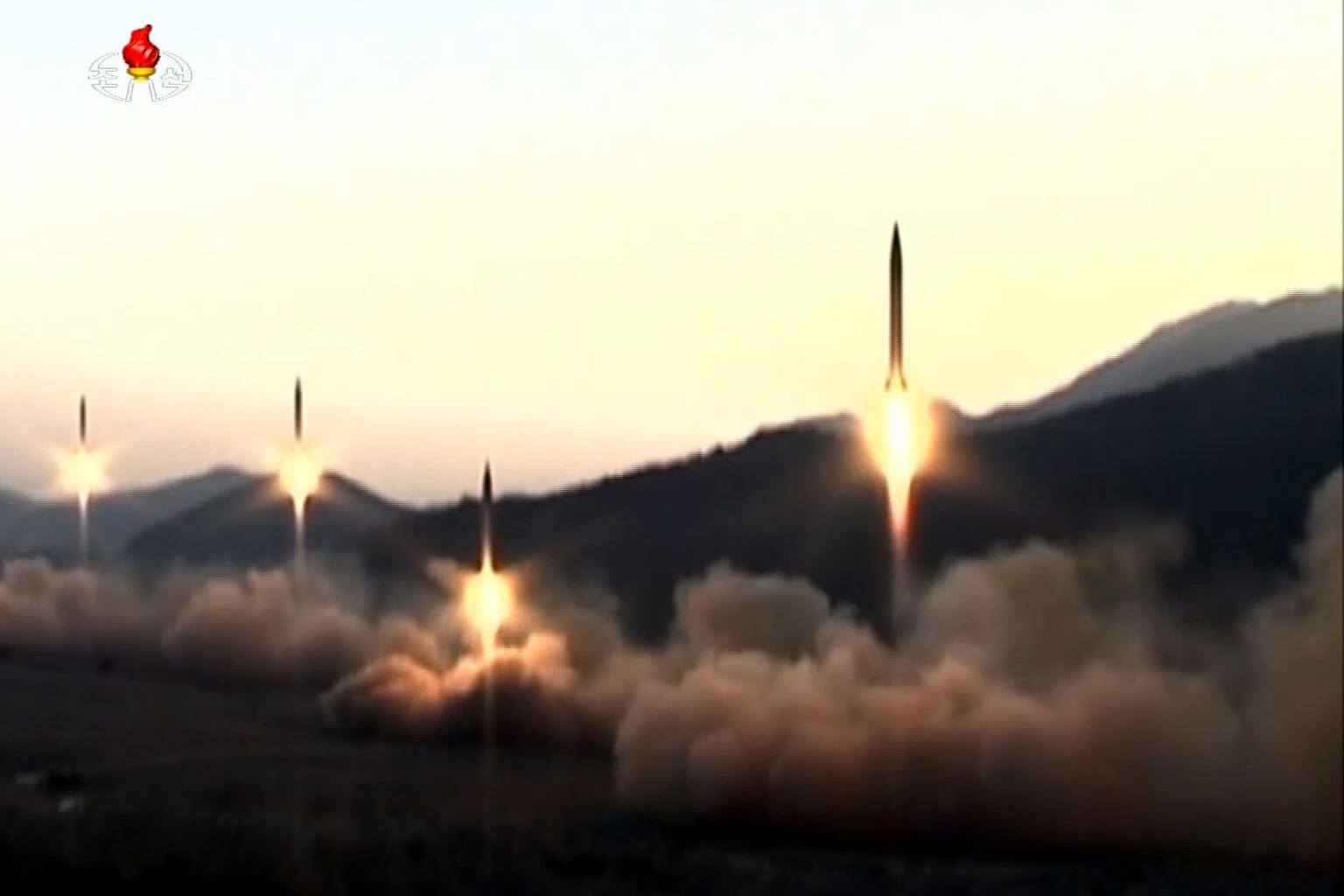Asean can't play role of bystander in Korean crisis: The Nation columnist
Sign up now: Get insights on Asia's fast-moving developments

Ballistic missiles being launched during a military drill from an undisclosed location in North Korea taken from North Korean broadcaster KCTV on March 7, 2017.
PHOTO: AFP/KCTV
Follow topic:
BANGKOK (THE NATION/ASIA NEWS NETWORK) - The phone call from United States President Donald Trump to Prayut Chan-o-cha last week came as a surprise to even the Thai premier himself. As it turned out, the "surprise" carried some "pleasant elements" as well as confusing signals.
President Trump had only one main message: how Thailand could help in putting more pressure on North Korea. The invitation for Prayut to visit the White House was a significant development in Thai-US relations, which have been "downgraded" since the military coup.
Thai officials see Trump's call as a positive "new direction" for the relationship.
You could almost say the call was the first step towards normalisation of bilateral relations. A senior official told me: "While the Obama government tried to avoid high-level contacts between Washington and Bangkok, Trump put through the call to our prime minister with the clear signal that things would return to normal if we jump on the anti-North Korea bandwagon."
There is little doubt that Prayut took Trump's gesture to mean that US pressure over the coup is being reconsidered as the White House under Trump reshuffles its foreign policy priorities. Democracy, human rights and human trafficking issues appear to have taken second place to North Korea in the new scheme of things.
In return, Thailand may not have to make too great a shift in her position against Pyongyang anyway. Bangkok's official stand has always been to follow United Nations Security Council resolutions on the matter.
US Secretary of State Rex Tillerson invited Asean foreign ministers to Washington just before the Trump-Prayut phone talk and asked them to help cut funding streams for North Korea's nuclear and missile programmes and to minimise diplomatic relations with Pyongyang.
A week before that, Tillerson called on all countries to suspend or downgrade diplomatic ties with Pyongyang, saying that North Korea abuses diplomatic privileges to help fund its arms programmes. He warned that Washington would sanction foreign firms and people who conduct business with North Korea if their own countries failed to act.
Thailand and every other Asean member have diplomatic relations with North Korea, and five have embassies there.
But even before Trump had called the leaders of the Philippines, Singapore and Thailand, North Korea was already approaching Asean for understanding and support.
In a March 23 letter to Asean's secretary general, North Korean Foreign Minister Ri Yong-ho warned the situation on the peninsula was "reaching the brink of war" because of Washington's actions.
He urged the Asean chief to inform foreign ministers of the 10-nation organisation "about the grave situation" on the peninsula "and give them a proper proposal", while criticising at length US-South Korean military exercises.
A statement released at the end of an Asean leaders' summit in Laos last year expressed "serious concern" over North Korea's nuclear testing and called on Pyongyang to abide by UN Security Council resolutions meant to curtail its atomic programme.
Diplomats said Ri's contact was a highly unusual move and probably the first time Pyongyang had written a letter seeking Asean's help on the issue.
Also, the move came at a time when Pyongyang's diplomatic ties with Asean member Malaysia were badly dented by the February assassination in Kuala Lumpur of Kim Jong-nam, the estranged half-brother of North Korean leader Kim Jong-un.
South Korea blamed Pyongyang for the killing, accusing its agents of using a banned nerve agent.
Growing expectations shared by Washington and Pyongyang that Asean can play a vital role prompt a crucial question: Can Asean mediate a political solution to the tensions on the Korean Peninsula?
The next question would be: Rather than being seen as part of the American effort to pressure North Korea, could Asean convince Pyongyang to use the "good offices" of this regional organisation to forge a diplomatic way out of the ongoing confrontation?
China's efforts to push North Korea back to the negotiating table don't seem to have worked. Trump's attempt to persuade the "smart cookie" in Pyongyang to drop his firm stance on nuclear development has failed to nudge Kim Jong-un into a softer stance.
Former Asean secretary-general Surin Pitsuwan has urged the regional grouping to strengthen its integration in the face of declining "multilaterism" - and to enhance the role of the Asean Regional Forum (ARF) to help solve the Korean crisis.
Surin lobbied hard to invite North Korea to join ARF in 2000 when he was the foreign minister of Thailand, which was chair of Asean at the time. All members of the now-dormant six-party talks to tackle Pyongyang's nuclear ambitions are in the ARF, but there has been no mention of this regional forum since the problem in the Korean Peninsula erupted.
"The ARF should take on bigger tasks and more critical issues, not just sit together and discuss natural disasters. It should face up to issues, and confront problems critical for the region," Surin said at a meeting of Asia News Network editors in Bangkok recently.
"My assumption is that North Korea is not going to make concessions to anybody - US, China or Japan - but it could give some signal to the ARF," he said.
However narrow the window of opportunity, Asean must rise to the challenge. Playing the role of a mere bystander as tension mounts in the region certainly isn't an option.

